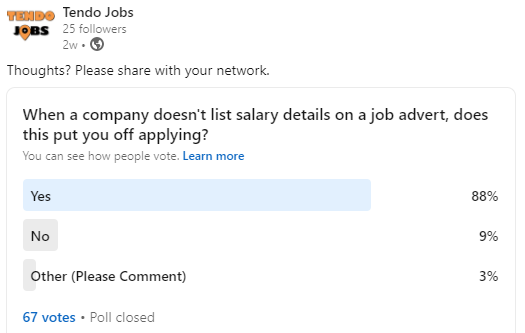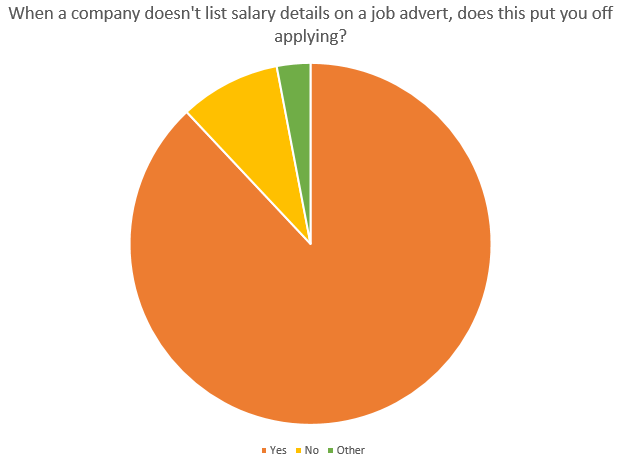One of the common queries that comes up time and time again within organisations is whether you should advertise the salary or salary band for a job when you are advertising for the role. Some employers fear the issues this can cause for current employees if the salary or salary band is not in line with current salaries, and other employers often believe that an undisclosed salary on a job advert can result in a wider range of applicants to the job to target from the junior level through to the senior level. We’ve found through a survey that the reality is significantly different…. By not advertising a salary or salary band you are missing out in 9/10 job hunters even applying for your job advertisement. Wow!
Survey Question and Results
Below you can see the results from the survey. We asked a generic question of “When a company doesn’t list salary details on a job advert, does this put you off from applying?”. And the results speak for their self. 9 out of 10 people who responded to the survey state that they are put off from applying for a job advertisement when there is no salary information listed.


Thoughts on Responses
The above responses are only a very small sample of the market and will naturally be skewed by the respondents background and experience. Never the less, let’s contemplate on the qualitative responses that have come through. Some of the comments that came through via social media channels include;
“Even if it was enforced to have a salary put in a spec. It would get filtered out by ‘depending on experience’” – Full Stack Developer
“I disagree that companies are all looking to underpay or exploit desperate circumstances but I do think it should be an absolute requirement to post salary information etc on a job article. It does allow for more transparent application and it does help remove wage disparities across society.” – Team Leader (Analyst) Complex Investigations
“They are looking for the lowest salary ask IMHO. They are looking for desperate people. The same way they always ask what your last or current salary is. Why not lie and put £1m (how will they find out what it really is?) I just say “none of your business”.” – Various Roles
Whatever your thoughts on the matter, you just need to appreciate this from a personal level. Imagine visiting an online store and asking the following questions and getting appropriate responses;
- “What is the maximum Watts that this sound system can produce?”……. “I’ll tell you once you’ve come into store and spoken to a sales person”.
- “What is the maximum Load that this washing machine can handle?”….. “I’ll tell you once you’ve come into store and spoken to a sales person”.
- “What is the maximum Miles per Gallon that this car can get?”…… “I’ll tell you once you’ve come into store and spoken to a sales person”.
- “What is the maximum Horse Power that this car can get?”….. “I’ll tell you once you’ve come into store and spoken to a sales person”.
Seriously, can you imagine saying “Hell Yeah! I’ll buy that now! ” to any of the above scenarios on a personal level? …… No? Well imagine how the job market is reacting to job advertisements that contain no salary information or at least salary banding information.
It’s no surprise that the majority of industries / sectors / markets are struggling to recruit for staff when companies aren’t being transparent with their offering. Imagine a market stall….. “We have Apples for sale”…. They could be Fresh, 1 week old, or 6 months old and rotting. In comparison, another market stall has….. “We have Apples for sales, Freshly picked today”. As an individual, who would you consider approaching for purchasing Apples? The job hunting world really is no different.
Top Tips
Be open and honest about salary information when posting your job roles online. Yes, you’re never going to be paying the top money for a job role, and that’s ok. Not every job hunter is looking for the cream of the crop as money isn’t everything to the vast majority of job hunters.
By posting your salary bands this at least manages the expectations of job hunters. For example, is it even worth them applying for the job role? You don’t want to go wasting time interviewing a potential employee only to find out after many hours of preparation and interviewing with multiple people to find out that what you are offering as an employer is £10,000 below what the job hunter is looking for in their next role.
Finally, if you still have the concern around how a job / replacement job role aligns with current salaries. Then you really need to be assessing your internal employee career personal development plans and setting salaries accordingly. If you are under paying existing staff and paying more for new employees, then you end up on the endless cycle of employee attrition whereby you lose existing staff when they move to other employers, and taking all of that business knowledge with them, and spending lots of time, money and resources training new employees on your business. When you look at the figures, it’s frightening how much extra money it costs to recruit new staff compared to with retaining existing staff.
Summary
It’s always fascinating when surveys are sent out to the market to see what information comes back. Hopefully this survey has provided food for thought on how job hunters perceive job advertisements when no salary information is advertised and how you can counteract that to increase the number of applicants to your roles.
